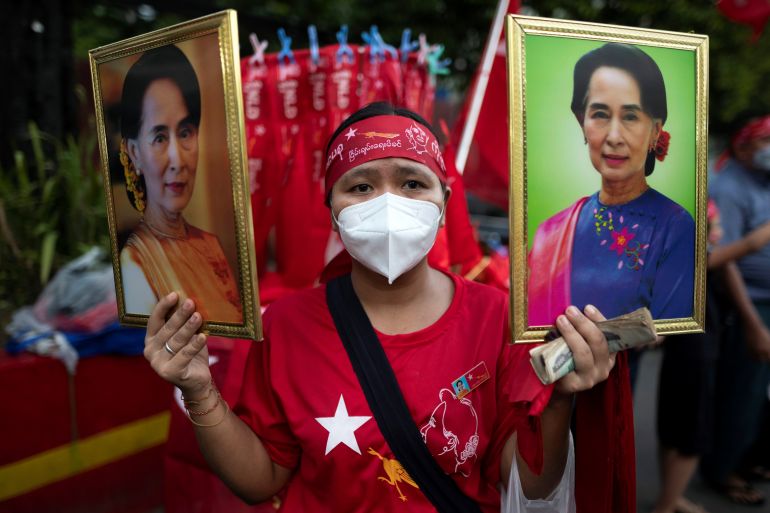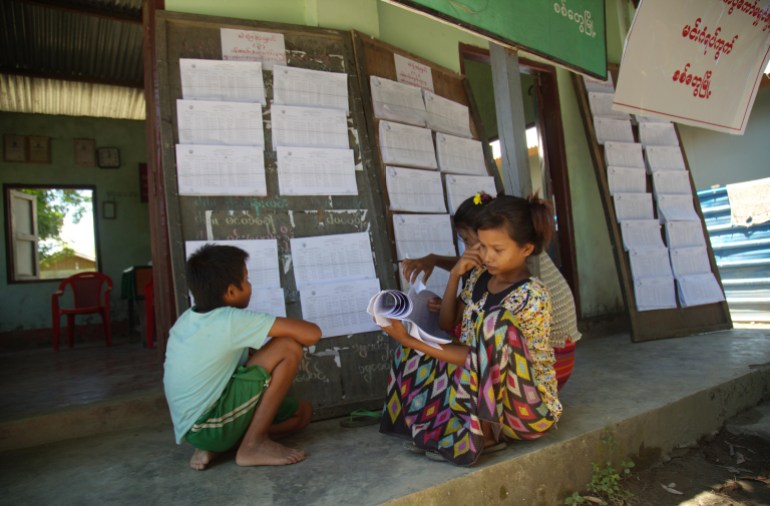Ethnic tension, conflicts key concern for Myanmar’s incoming MPs

Yangon, Myanmar – On November 8, the National League for Democracy won another resounding victory in Myanmar’s national election, claiming 920 of the 1,117 seats available in the local and national parliaments and improving on its 2015 landslide.
The election was marred by some significant shortcomings – mainly the exclusion of the Rohingya Muslim majority and widespread vote cancellations in Rakhine – but was free of any serious irregularities and widely seen as reflecting the NLD’s continued overwhelming popularity.
Keep reading
list of 4 items‘Only one choice’: Myanmar votes in second democratic election
Myanmar ‘undermining lifeblood of democracy’ before polls
Vote cancellations trigger outrage among Myanmar minority voters
The pro-military Union Solidarity and Development Party (USDP) failed to win even in its former strongholds in the Buddhist heartlands and Yangon-based political analyst Richard Horsey said it is “effectively dead at this point as a national political force”.
While turnout for the election has been estimated at a staggering 71 percent, not everybody is enthusiastic about the political process, however.
Yangon-based activist Thinzar Shunlei Yi chose not to vote.
“Never thought I would be in this point. I was always overexcited about elections and politics,” she said in a message on election day. The main factor in her decision to boycott was the exclusion of ethnic minorities. “I feel guilty as if my vote is granted because I’m from the majority ethnicity,” she said. “I stand in solidarity with those whose rights are denied.”

All eyes are now trained on ethnic relations and democratic development, both policy areas where the government of Aung San Suu Kyi failed to make headway in its first term.
“The scale of the NLD’s victory gives it the space and political capital to adjust some of its policies and tackle more unpopular or controversial issues. Whether it will do so, or double down on the successful formula it has followed so far, remains to be seen,” Horsey said.
The new parliament is expected to sit in February.
Al Jazeera spoke to three incoming first-time members of parliament from different parties, ethnic backgrounds, and parts of the country about their plans for the upcoming term.
Win Mya Mya, 77, National League for Democracy

Win Mya Mya, a 77-year-old Muslim candidate from the NLD won a seat in the national parliament in Mandalay Region, after being controversially passed up by the party in 2015, a decision many attributed to religious discrimination.
“It started with the 1988 uprising,” Win Mya Mya said of her political career. She joined the mass protests against the military dictatorship that year, led by Aung San Suu Kyi, and was one of the founding members of the NLD. “At that time, we faced a lot of difficulties,” she said.
The next few decades were a revolving door of arrests, with Win Mya Mya often using her own money to support NLD political prisoners.
She said she was frequently detained, questioned, and intimidated for short periods of time. “In 1999, my brother and sister were arrested and sentenced to many years in prison. I was detained again in 2000 and released in 2001,” she said. But following the 2008 Saffron Revolution protests, she was confronted with a more serious sentence.
“I was sentenced to 12 years in prison,” she said, but ultimately serving only about four.
“Living alone in prison caused me psychological problems. I couldn’t see anyone, and I had nowhere to go. With the help of a prison doctor, I was allowed to walk outside for about half an hour a day.” Win Mya Mya served most of her sentence in Putao, located in the remote northern reaches of Myanmar, among the foothills of the Himalayas. She remained behind bars until 2012, when she received a presidential pardon.

Undaunted, she immediately returned to politics. “In 2013, I was elected by the people at the National Party Congress to become vice-chair of the Mandalay Region,” she said, a position she still holds.
When asked how she feels to finally be a member of parliament after a lifetime of struggle, she is modest. “I see it as a job,” she said. “I am very happy to be able to work for the people in parliament.”
The NLD is known for being a highly centralised organisation, and Win Mya Mya declined to name any particular issue she would focus on in parliament, saying she did not know what tasks she would be “assigned”.
She dodged questions about the NLD’s decision to exclude her from the 2015 election, instead praising the party’s performance. “The NLD government has done a lot in five years. Roads and bridges in every township. Reforms in the education system, electricity distribution,” she said. While she was not a member of parliament, she was still a high-ranking member of the party, and said she was able to work on healthcare reform in that capacity.
Win Mya Mya admitted religious discrimination against Muslims exists in Myanmar but denies that the NLD itself discriminates. “They are friendly regardless of race,” she said, also declining to comment on the Rohingya crisis, which is the subject of a genocide investigation at the UN’s top court.
Aung Thar Noe, 45, Arakan National Party

In Rakhine State, where Myanmar’s most intense conflict rages, the local Arakan National Party once again won the most seats in the national and state legislatures, despite widespread election cancellations, which mostly affected areas it won in 2015. The cancellations meant the ANP fell short of winning an outright majority in the state parliament, but it did win in areas that the NLD had taken last time.
Horsey said the results show the ANP has “consolidated its hold over the former NLD strongholds … in the south of Rakhine State”.
Aung Thar Noe is a 45-year-old who was recently elected to the Rakhine State parliament for the ANP, after decades in civil society. “I decided to participate in politics more deeply because I want to save the Rakhine people,” he said. He was elected to the ANP’s central executive committee just last year.
“Being in Rakhine there is no other organisation that represents the interest of the Rakhine people,” he said. Aung Thar Noe was elected in Sittwe, the capital of Rakhine and one of the very few constituencies in the northern part of the state that actually held elections this year. He says the mass cancellations in the rest of northern Rakhine increase his responsibility.

“I have to perform and carry out the duty for the areas with no election. I am the only MP from northern Rakhine area where we have our own issues; the conflict, war crimes, [internally displaced people]. I have to devote more time than an ordinary MP in other parts of the country because I’m representing so many people,” he said.
While he hopes the local government can accomplish more this term, he said it depends on the NLD, which “refused to cooperate or share power” in the last five years, despite the ANP winning a majority in Rakhine in 2015. Since no party won a majority this year, the NLD will have to decide whether to form a coalition with the ANP or the military bloc. Aung Thar Noe said if the NLD chooses to work with the ANP, the risk of increased conflict could be reduced.
Horsey said the first real test will be the selection of the state parliament speaker early next year. “If the NLD bloc joins forces with the military bloc to push through its candidate, this will anger Rakhine political leaders; if the NLD cooperates with the Rakhine parties on a consensus candidate, this could be an important signal of the NLD’s willingness to consult more with ethnic parties over key decisions, and could help to de-escalate political tensions,” he said.
Nai Layae Tama, 57, Mon Unity Party

In Mon State, two ethnic Mon parties merged to form the Mon Unity Party in an attempt to avoid splitting the vote after a poor showing in the 2015 election. The MUP improved on its 2015 haul, winning five seats in the national parliament and six in the state parliament but was still a distant second to the NLD which won an outright majority in the state.
Nai Layae Tama, a 57-year-old incoming member of parliament for the Mon State parliament, came to politics via conflict. From 1987 until 1998, he served in the New Mon State Party, the political wing of the main Mon armed group, retiring a few years after the ceasefire agreement of 1995. “Then I took a rest and focused on my farming business,” he said.
He re-entered politics in 2012, before becoming general secretary of the Mon National Party in 2015, one of the two parties that merged to become the MUP.
“I have been immersed in politics all my life,” he said. “During the five-year term of the NLD government, I have not been satisfied with the NLD’s attitude towards ethnic parties,” he added.
Nai Layae Tama said his personal priority is to create a community development committee in Mon State that is elected by the people. The local parliament has drafted the law, but it has remained stalled. “When I enter parliament, I will push to finish the community development law as soon as possible,” he said.
He said much of the MUP’s goals will “depend on how positive the NLD can be in dealing with ethnic parties.” “We will have to wait and see,” he said.
Horsey said some ethnic parties are “blaming an unfair NLD incumbent advantage” and “restrictions on campaigning due to COVID-19” for their poor results. However, he also expects the election loss will “prompt much soul-searching”. “If they conclude that the electoral system is stacked against them, this could deepen political division – and in some places, armed conflict,” he said.
Nai Layae Tama seems willing to continue engaging in electoral politics for now but needs to see some compromise from the NLD this term. He said there “are various reasons” why the party did worse than expected, but that he is still generally “satisfied” with the result. “In the constituencies, we lost, the vote was very close,” he said, adding that many Mon migrant workers were not able to come home and vote due to COVID-19 travel restrictions.
The MUP’s continued engagement with the political process will also depend on the NLD’s engagement in the peace process. “If we can become an inclusive government after the results of the recent election, it would be very helpful for peace,” he said.